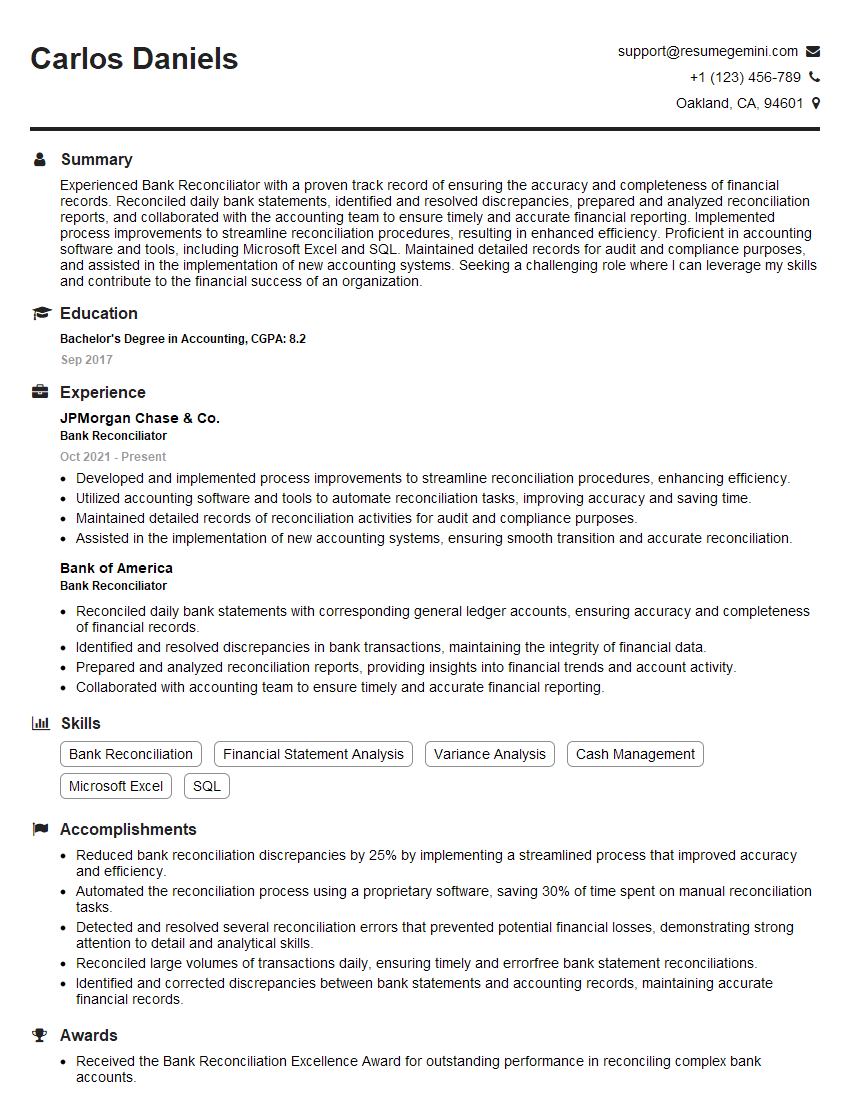Are you a seasoned Bank Reconciliator seeking a new career path? Discover our professionally built Bank Reconciliator Resume Template. This time-saving tool provides a solid foundation for your job search. Simply click “Edit Resume” to customize it with your unique experiences and achievements. Customize fonts and colors to match your personal style and increase your chances of landing your dream job. Explore more Resume Templates for additional options.

Carlos Daniels
Bank Reconciliator
Summary
Experienced Bank Reconciliator with a proven track record of ensuring the accuracy and completeness of financial records. Reconciled daily bank statements, identified and resolved discrepancies, prepared and analyzed reconciliation reports, and collaborated with the accounting team to ensure timely and accurate financial reporting. Implemented process improvements to streamline reconciliation procedures, resulting in enhanced efficiency. Proficient in accounting software and tools, including Microsoft Excel and SQL. Maintained detailed records for audit and compliance purposes, and assisted in the implementation of new accounting systems. Seeking a challenging role where I can leverage my skills and contribute to the financial success of an organization.
Education
Bachelor’s Degree in Accounting
September 2017
Skills
- Bank Reconciliation
- Financial Statement Analysis
- Variance Analysis
- Cash Management
- Microsoft Excel
- SQL
Work Experience
Bank Reconciliator
- Developed and implemented process improvements to streamline reconciliation procedures, enhancing efficiency.
- Utilized accounting software and tools to automate reconciliation tasks, improving accuracy and saving time.
- Maintained detailed records of reconciliation activities for audit and compliance purposes.
- Assisted in the implementation of new accounting systems, ensuring smooth transition and accurate reconciliation.
Bank Reconciliator
- Reconciled daily bank statements with corresponding general ledger accounts, ensuring accuracy and completeness of financial records.
- Identified and resolved discrepancies in bank transactions, maintaining the integrity of financial data.
- Prepared and analyzed reconciliation reports, providing insights into financial trends and account activity.
- Collaborated with accounting team to ensure timely and accurate financial reporting.
Accomplishments
- Reduced bank reconciliation discrepancies by 25% by implementing a streamlined process that improved accuracy and efficiency.
- Automated the reconciliation process using a proprietary software, saving 30% of time spent on manual reconciliation tasks.
- Detected and resolved several reconciliation errors that prevented potential financial losses, demonstrating strong attention to detail and analytical skills.
- Reconciled large volumes of transactions daily, ensuring timely and errorfree bank statement reconciliations.
- Identified and corrected discrepancies between bank statements and accounting records, maintaining accurate financial records.
Awards
- Received the Bank Reconciliation Excellence Award for outstanding performance in reconciling complex bank accounts.
Certificates
- Certified Bank Reconciler (CBR)
- Certified Public Accountant (CPA)
- Certified Internal Auditor (CIA)
- Certified Management Accountant (CMA)
Career Expert Tips:
- Select the ideal resume template to showcase your professional experience effectively.
- Master the art of resume writing to highlight your unique qualifications and achievements.
- Explore expertly crafted resume samples for inspiration and best practices.
- Build your best resume for free this new year with ResumeGemini. Enjoy exclusive discounts on ATS optimized resume templates.
How To Write Resume For Bank Reconciliator
- Highlight your experience in reconciling high-volume bank transactions accurately and efficiently.
- Quantify your achievements whenever possible, using metrics such as the number of discrepancies resolved or the percentage of time saved through process improvements.
- Demonstrate your proficiency in accounting software and tools, including Microsoft Excel and SQL.
- Emphasize your ability to work independently and as part of a team, as well as your attention to detail and strong analytical skills.
- Tailor your resume to each specific job application, highlighting the skills and experience that are most relevant to the role.
Essential Experience Highlights for a Strong Bank Reconciliator Resume
- Reconciling daily bank statements with corresponding general ledger accounts
- Identifying and resolving discrepancies in bank transactions
- Preparing and analyzing reconciliation reports
- Collaborating with the accounting team to ensure timely and accurate financial reporting
- Developing and implementing process improvements to streamline reconciliation procedures
- Maintaining detailed records of reconciliation activities for audit and compliance purposes
- Assisting in the implementation of new accounting systems
Frequently Asked Questions (FAQ’s) For Bank Reconciliator
What are the key responsibilities of a Bank Reconciliator?
The key responsibilities of a Bank Reconciliator include reconciling daily bank statements, identifying and resolving discrepancies, preparing and analyzing reconciliation reports, collaborating with the accounting team, developing and implementing process improvements, maintaining detailed records, and assisting in the implementation of new accounting systems.
What are the qualifications required to become a Bank Reconciliator?
Typically, a Bank Reconciliator requires a Bachelor’s Degree in Accounting or a related field, along with strong analytical, problem-solving, and attention to detail skills.
What are the career prospects for a Bank Reconciliator?
Bank Reconciliators can advance to roles such as Senior Bank Reconciliator, Accounting Manager, or Financial Analyst, with experience and additional qualifications.
What are the key skills required to be a successful Bank Reconciliator?
To be successful as a Bank Reconciliator, one needs strong accounting knowledge, proficiency in accounting software, analytical and problem-solving skills, attention to detail, and the ability to work independently and as part of a team.
What are the challenges faced by Bank Reconciliators?
Bank Reconciliators may face challenges such as dealing with large volumes of transactions, identifying and resolving complex discrepancies, meeting tight deadlines, and keeping up with changing accounting standards and regulations.
What are the best practices for Bank Reconciliation?
Best practices for Bank Reconciliation include timely reconciliation, thorough review of transactions, investigation and resolution of discrepancies, documentation of adjustments, and regular monitoring of reconciliation accounts.
What are the common mistakes to avoid in Bank Reconciliation?
Common mistakes to avoid in Bank Reconciliation include ignoring small discrepancies, not investigating unusual transactions, failing to document adjustments, and not reconciling on a regular basis.
What is the importance of Bank Reconciliation?
Bank Reconciliation is important as it ensures the accuracy and completeness of financial records, helps identify errors and fraud, supports compliance with accounting standards, and provides insights into cash flow and bank account activity.